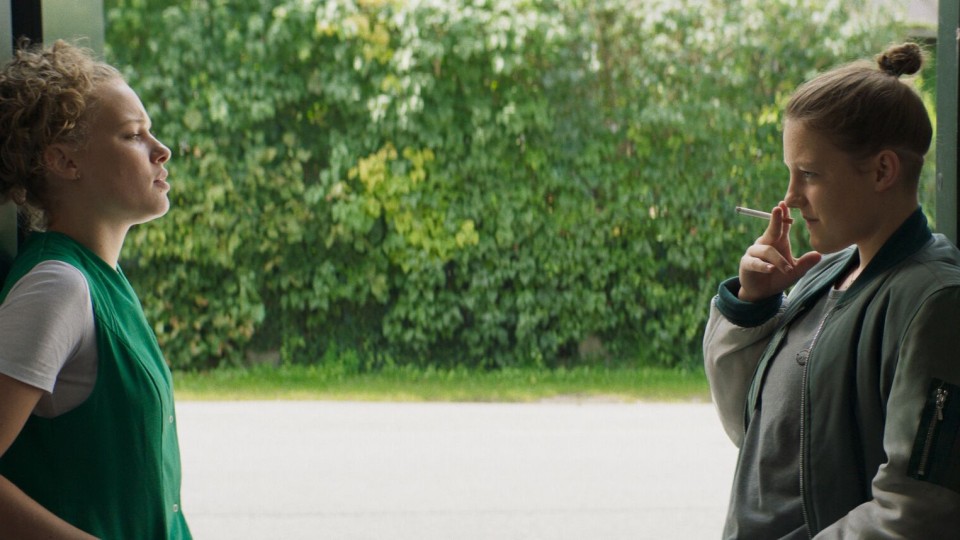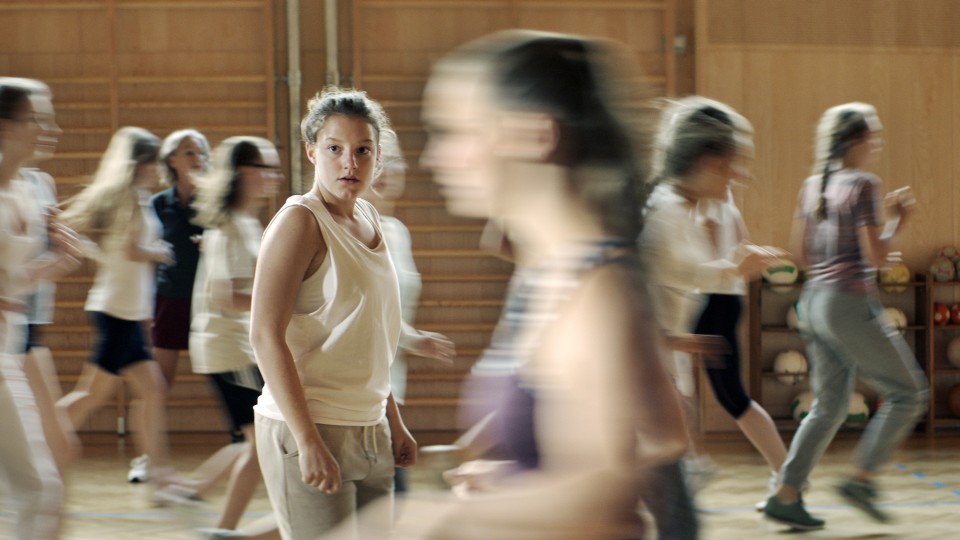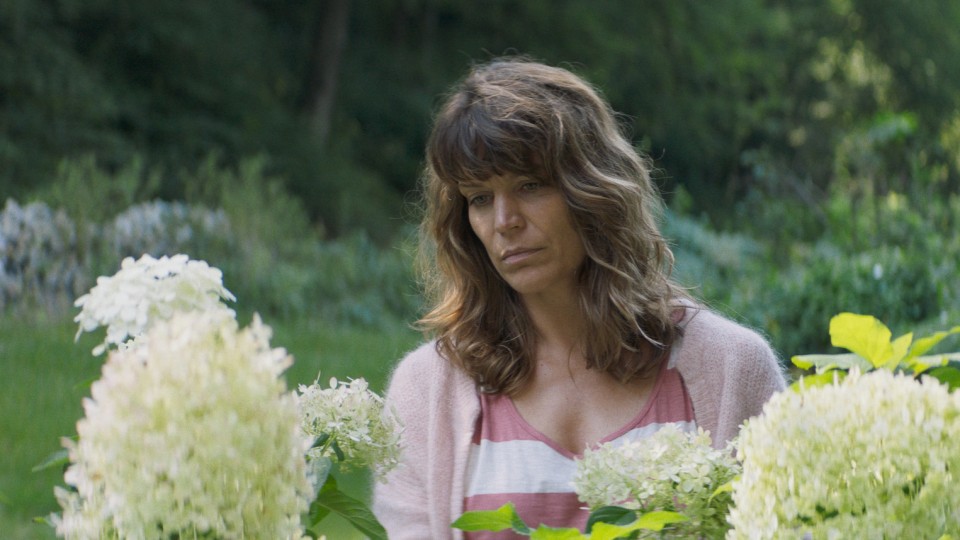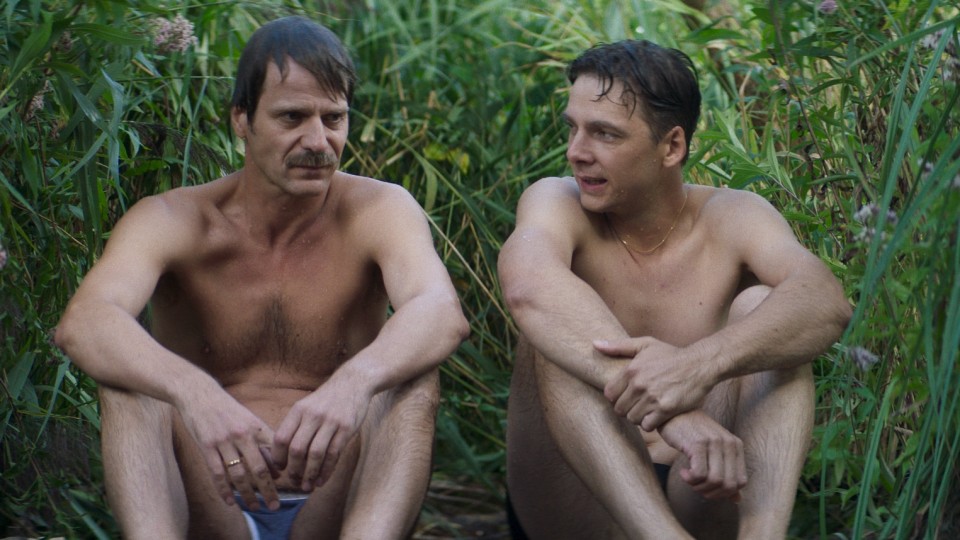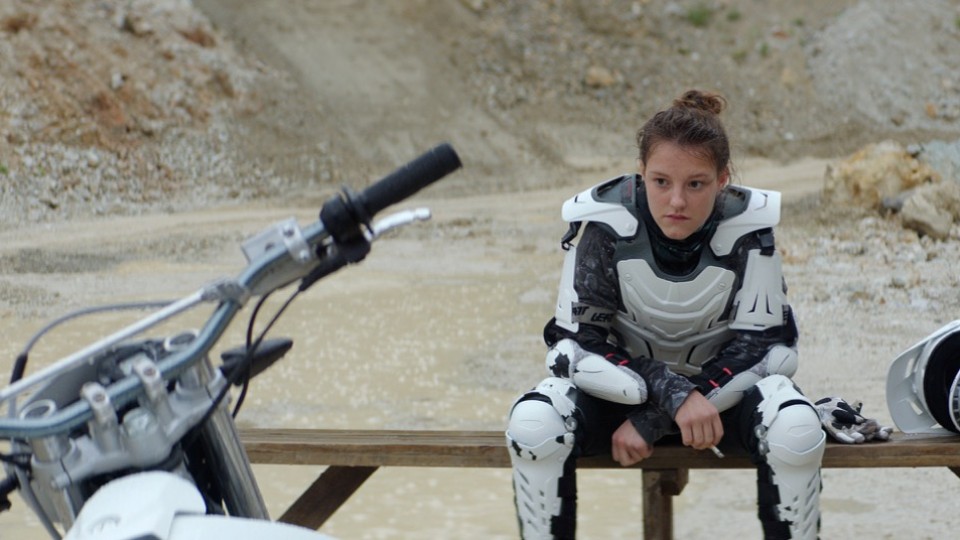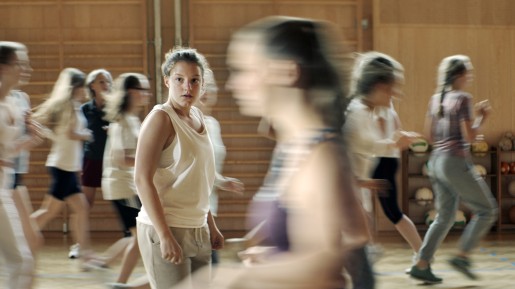In the first sequence of L’Animale two motorcyclists – in full protective clothing – move around each other on their bikes, though they are mainly
circling themselves. The roaring of the engines, the dizziness, the spinning, the force to be controlled, the fragile balance,
the self-centred attitude… is this image an early representation of everything connected with the phase of late adolescence
around which your new film revolves?
KATHARINA MÜCKSTEIN: The subject of motocross riders appealed to me so much because there is something very powerful about it; the figures in
protective clothing are a good image of lack of permeability and the hard, almost impenetrable surfaces we carry around with
us. However, it's also simply a symbol of masculinity and being cool, and in the end that's what my film is about to a very
great extent. In the opening sequence of L'Animale I was less concerned with focusing on the youngsters themselves; it's much more that I wanted something charged with movement
and action as a prelude to the film.
You depict the state of being adolescent in the countryside rather than an urban area. What motivated you to set your story
there instead of in a city?
KATHARINA MÜCKSTEIN: I'm interested in the intermediate area between city and countryside – the affluent suburbs – which is also the
interface between nature and civilisation. It’s a good place to locate subjects such as the romanticisation of natural
life, the mystification of nature versus civilisation and progress. We're living in a time when there is a constant discussion
of where we should take our orientation: do we long to return to a romanticised primaeval state, or can we overcome our fear
of the unknown and head forward in search of progress? That's a subject in L'Animale that I wanted to penetrate all levels: narrative, location and tonality.
Did this zone between the city and the countryside also appeal to you as an environment for your characters because it is
a sphere where traditional and more open, contemporary interpretations of gender roles intersect?
KATHARINA MÜCKSTEIN: I've been interested in feminist and queer philosophy since adolescence, and I find it extremely puzzling that these days,
depending on the argument we want to put forward, we employ a whole range of speculative assumptions about the "naturalness"
of sexual orientation. On the one hand we want to regard ourselves as these sensitive, civilised beings, but on the other
we appeal to nature and our instinctive drives… if that suits us. So what is it we want to be: animals or people? And
what proportion of each do we carry around within us? I found it very appealing to bring these two different kinds of self-awareness
together, because I believe that both are part of being a complete person. We need contact with intuition, a link to some
sort of naturalness and emotionality, but we also need the will to become self-determining, to emancipate ourselves from being
creatures governed by drives and untouchable rationality.
You have written a new leading role for your protagonist from Talea, Sophie Stockinger. Why did you want to work with her again? How did her character take shape?
KATHARINA MÜCKSTEIN: After Talea I was determined to make another film with Sophie Stockinger before she was fully grown. I made this the goal of all my efforts,
because I knew how long it takes to get a feature film made. We only just got there. Sophie was 14 when we filmed Talea and 18 years old when we were filming L'Animale. While shooting Talea I came to realise how much can develop when the two of us work together. It impressed me so much that a young actress without
any classical training at all can have so much technique, feeling for character and scenic understanding. I didn't want to
miss this opportunity. And with L'Animale I also wanted to take the work with Sophie a step further and write a part for her which is further away from her character.
We approached the character of Mati by means of many long discussions and also via body training. Appreciating the role intellectually
is a pre-requisite, and that's one part of it, but another part is to get there by means of being. As a director I consider
the route of working with the body to be of key importance. Sophie can do that very well, but she had to overcome several
hurdles for this part.
She experiences the dilemma of emancipation: that deciding in favour of one person also means deciding against another person.
KATHARINA MÜCKSTEIN: The people in L'Animale seem at first sight to determine their own destinies, but in fact they are stuck in a restrictive social straitjacket. In
order to free themselves they have to abandon the idea that everything is harmonious, that is possible to be liked by everyone,
that everything feels constantly safe and predictable. I'm driven by the desire to see society per se take a step towards
becoming mature and autonomous. That means as an individual moving away from the childlike desire for safety and acceptance
and, as a society, adopting a critical attitude towards authority and power. The point is to move towards an alliance between
reason and sensitivity. My characters make it clear that abandoning positions of safety involves great anxiety, but also that
we can dare take that step. This is where the political and the personal come together: there are things that each individual
can learn for himself or herself, and there are things that we as a society have to learn in order to develop visions for
the future.
In the countryside, being different from the others can have serious consequences. Overcoming that fear is what Mati calls
in her German lesson the central doorway to freedom. But isn't it more fear of standing still, of making the wrong decisions
in life, of crucial changes, that constitutes her real predicament?
KATHARINA MÜCKSTEIN: That's certainly true for Mati. However, the focus is also on the story of her parents. They too sense that they can't stay
for ever where they are at the moment. And this realisation triggers incredible anxiety for them. They may have some sense
of what a liberated self might look like. But getting there is extremely difficult. That's why I'm interested in characters
who are torn between what they want and what they think they should do. The parents make it apparent to us who we could become:
that we have a tendency to tolerate a huge amount under the surface which really isn't good for us purely in order to maintain
control over our being. But they are also very likeable and show us that it is impossible to do everything right in life.
The story of the parents in L'Animale shows us what kind of pain is caused when you realise late in life that you've been putting on an act for a very long time,
not being entirely sincere or not allowing yourself to do something. But their story also shows that it's never too late to
be true to yourself and find an authentic way of being.
Franco Battiato’s chanson L’Animale plays a central role, not only in the movement of the plot. How did this Italian song contribute to the development of the
material? What prompted you to have your main characters sing at their moment of greatest solitude?
KATHARINA MÜCKSTEIN: When I started writing the screenplay I happened to hear that chanson by Franco Battiato, though I knew it already. And I
suddenly realised that each of my characters could sing that song, because the lyrics relate to a central subject of the film.
Battiato sings about the animal in himself, but he doesn't regard it as a kind of primaeval drive; instead it's more like
an intuitive element, something completely authentic that can't be compromised. He has an ironic view of this animal, because
it constantly wants something that he doesn't want or shouldn't want. At the same time he knows that the animal will always
win out in the end. I like the idea that we can't ever conceal what happens authentically inside us, even if we mobilise all
our strength in effort to do so, and no matter how tightly we lace up the social straitjacket. It will always find a way to
come out and claim its place. In terms of artistic techniques I’m always in search of things which are between the lines,
which open up space for thoughts and feelings. Music is one way of doing this. Since I don't want to employ music manipulatively,
it made more sense to use the music directly. The moment when all the characters start singing is one I myself would like
to see more often in the cinema. It's supposed to be a moment when you can just let yourself go.
Who wins in life? Fear or passion? What we see of the parents’ generation in your film leaves several things open. And
it's not clear how courageous Mati will be in future. A lot of things are left hanging. Was that also part of your goal, to
create a narrative in this state of hanging free?
KATHARINA MÜCKSTEIN: While I was working on the screenplay I talked a lot to Mati Kitzberger, Wolfgang Widerhofer and Libertad Hackl about the
possible end of L'Animale I always ended up in the same position: with regard to humanist emancipation and also the subject of gender identity in modern
society it would seem overly romantic to depict some sort of final emancipation. However, since I feel people have huge potential,
and I want people to emancipate themselves, I'd like to see the audience coming out of the film feeling encouraged. Emancipation
is possible. In the end all the characters in the film realise that moving towards emancipation, opposing conventions and
refusing to join in with everything means you have to reckon with hostility and possible aggression. That's where we are as
a society. I couldn't force myself to write a happy end, but I didn't want to make the end fatalist either, so it was clear
the end had to remain open.
Interview: Karin Schiefer
November 2017
Translation: Charles Osborne

